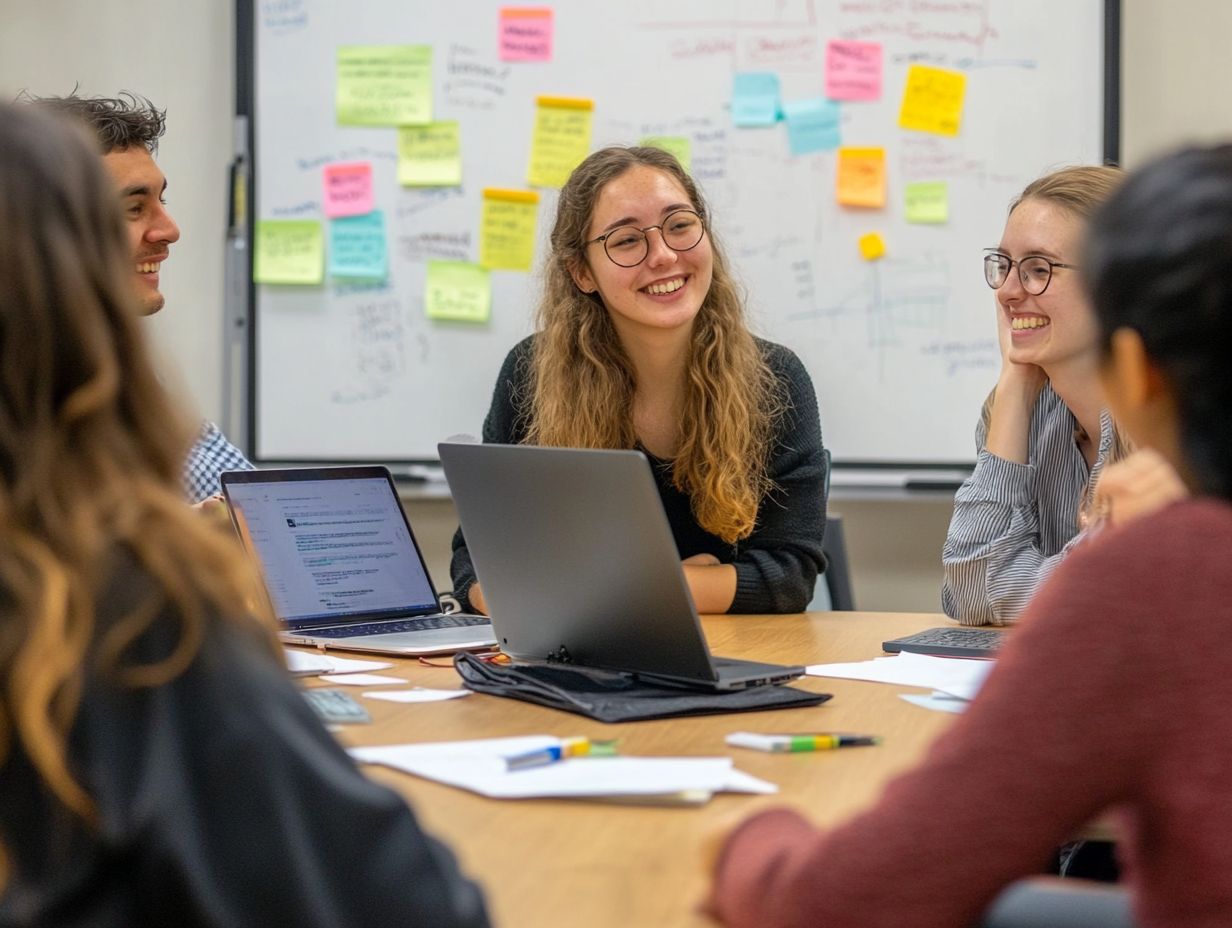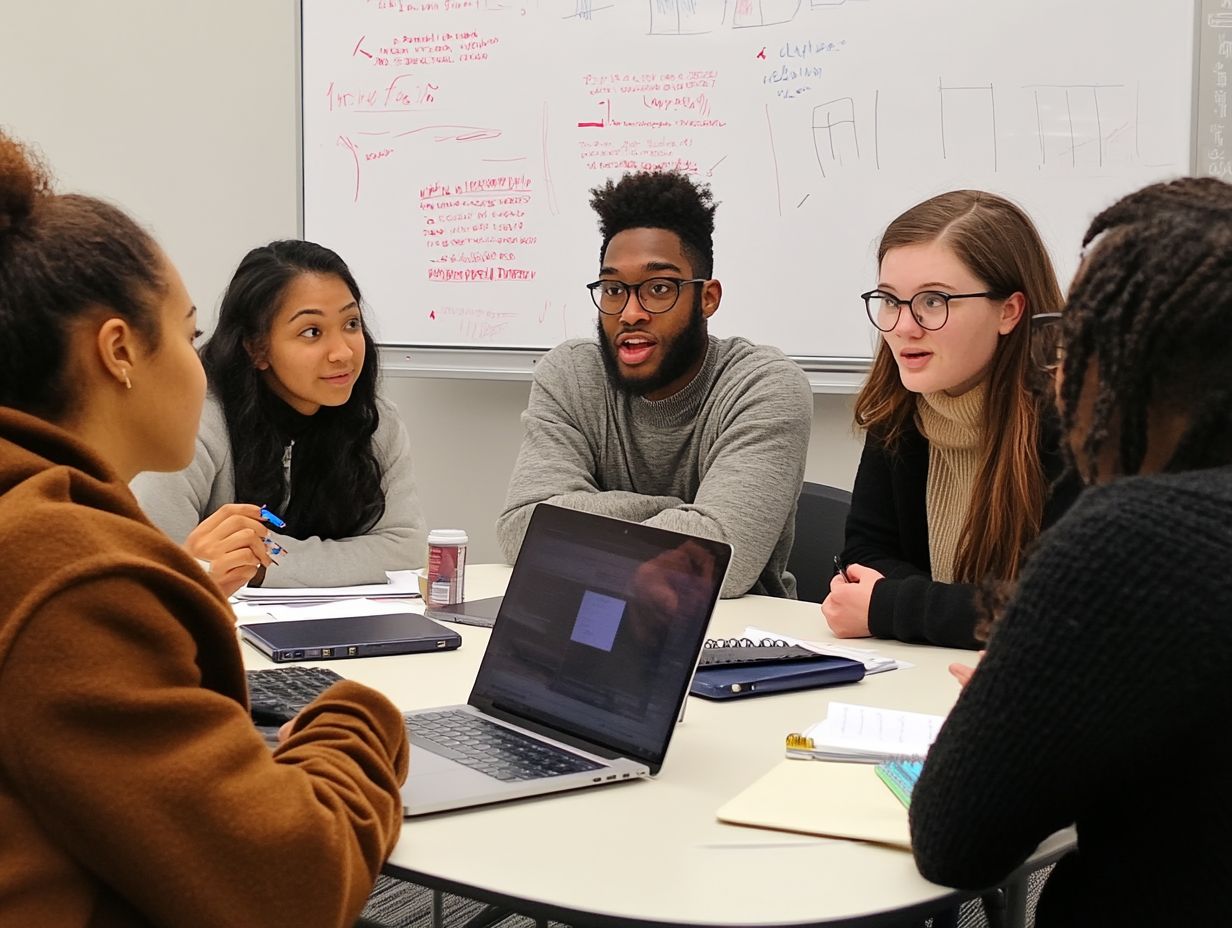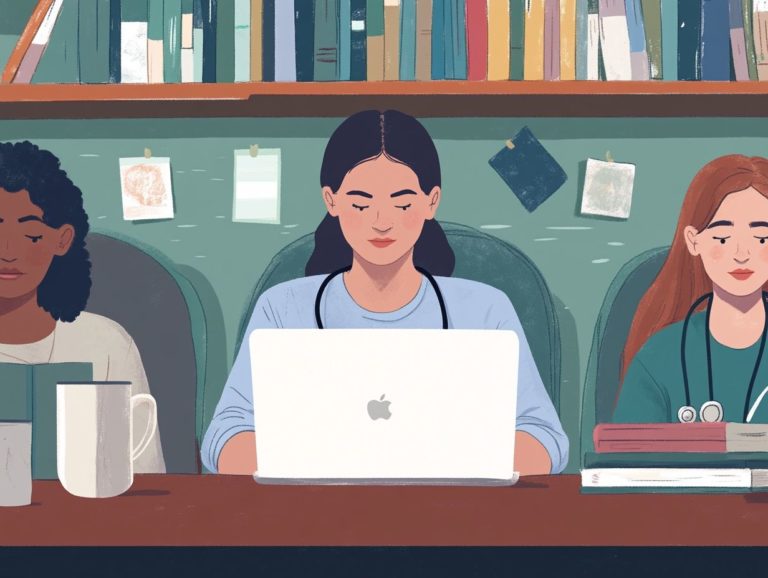Finding Your Doctoral Advisor: A Guide
Embarking on a doctoral journey is a thrilling yet challenging endeavor. Selecting the right doctoral advisor can profoundly influence both your experience and success.
This guide explains the pivotal role of a doctoral advisor and highlights key attributes to seek in an ideal mentor. You ll delve into understanding their research expertise, evaluating communication styles, and assessing personal compatibility crucial elements that warrant your attention.
You can also find practical steps for researching and contacting potential advisors, ensuring that your choice aligns seamlessly with your academic aspirations.
Contents
Key Takeaways:
- Choose a doctoral advisor who aligns with your research interests.
- Look for someone who communicates effectively.
- Seek a mentor with a compatible personality.
- Research potential advisors, reach out, and set up meetings.
- Ask relevant questions to make an informed decision.
- After evaluating your options, formally ask someone to be your advisor by clearly outlining your expectations and goals.
Understanding the Role of a Doctoral Advisor
Understanding the role of your doctoral advisor is crucial to your PhD journey. They offer essential guidance every step of the way.
A competent PhD supervisor helps you manage your research projects and significantly influences your overall development.
Their impact extends to your publication record, career opportunities, and even your emotional well-being. The dynamics of your relationship with your advisor can greatly affect the quality and success of your PhD experience.
It s crucial to understand the qualities of an effective supervisor and how those align with your needs. This fosters a supportive academic environment that promotes your success.
What is a Doctoral Advisor?
A doctoral advisor, often known as a PhD supervisor, serves as your academic mentor, guiding you through your research endeavors and the overall rigors of your program.
This vital role encompasses not just sharing expert knowledge but also cultivating a nurturing environment where you can excel both academically and personally.
Effective communication is essential; your advisor will help you manage the intricate landscape of research methodologies, data analysis, and academic writing.
Establishing a strong rapport with your advisor is key it fosters open dialogue and ensures you feel valued and understood throughout your journey.
The importance of mentoring in academic contexts is immense. It significantly impacts the development of future scholars and researchers, shaping their professional paths and contributing to the growth of knowledge across diverse fields.
The Importance of Choosing the Right Advisor
Choosing the right PhD supervisor is essential for your success. This decision can profoundly impact your academic future and career trajectory.
This choice goes beyond simply securing academic guidance; it s about cultivating a mentoring relationship that fosters both professional growth and personal development.
An emotionally supportive advisor can be your anchor, helping you manage the inevitable challenges of research while encouraging resilience and motivation.
Compatibility is key; when you and your supervisor align on goals and work styles, you create an environment ripe for creativity and productivity.
A supervisor s connections can also be a treasure trove of career advice, opening doors to networking opportunities and insights that are crucial for maneuvering through the intricate post-graduate landscape.
Factors to Consider When Choosing an Advisor
When selecting a PhD supervisor, consider these key factors as they significantly influence your research experience and overall development:
- The advisor’s research interests and expertise.
- Their communication style.
- How well you align on goals and work habits.
- Their network and connections in your field.
- Emotional support and mentorship style.
Choosing the right mentor can make all the difference in navigating your academic journey.
Start your advisor search today and take a significant step towards your PhD success!
Research Interests and Expertise

The research interests and expertise of a PhD supervisor are crucial. They directly influence how well their knowledge aligns with your research goals.
When you and your advisor share compatible research interests, it creates a strong foundation for collaboration. This alignment fosters an environment where ideas can flow seamlessly, allowing both of you to engage deeply with your subject matter.
As supervisors guide students through complex challenges, they tap into a shared passion. This enhances communication and brainstorming two essential ingredients for innovative research.
This synergy boosts collaboration skills and greatly enhances your chances of achieving impressive results in your research!
Ultimately, a harmonious research relationship can shape the trajectory of your academic career.
Communication and Availability
Effective communication and the availability of a PhD supervisor are essential elements that significantly enhance the mentoring relationship.
When supervisors are approachable and foster open discussions, you feel more at ease to express your concerns and share both academic and personal challenges.
This ongoing dialogue clarifies expectations and cultivates trust and mutual respect.
By remaining accessible, your advisor can promptly address any issues that arise. This ensures you receive the timely support necessary to navigate the complexities of your research journey.
With consistent interaction, you become better equipped to seek guidance, share setbacks, and celebrate milestones, ultimately enriching your educational experience.
Compatibility and Personalities
The compatibility and personalities of both you and your PhD supervisor can significantly shape your mentoring experience and the success of your research projects.
When both of you possess complementary traits, it cultivates an environment where open communication flourishes. This promotes a supportive atmosphere essential for your academic growth.
Emotional support is crucial here, as personality variations can influence how you tackle challenges and collaborate with peers.
If you have a proactive disposition, you may find it much easier to thrive with a supervisor who shares that enthusiasm and approachability.
This synergy not only helps you navigate potential hurdles but also enhances group dynamics, leading to more effective teamwork and innovative solutions in your research initiatives.
Steps to Finding Your Advisor
Finding the right PhD supervisor is essential to your success, so approach this task thoughtfully!
This crucial match can significantly shape your academic journey, influencing not just your studies but also your overall experience in the program.
Researching Potential Advisors
Researching potential PhD supervisors is essential, as it enables you to assess their research projects, publication records, and overall compatibility with your academic goals.
By exploring platforms like Google Scholar, you can evaluate these advisors’ publication records. Look at metrics such as citation counts and citation metrics. This information highlights their academic contributions and reveals how relevant their work is to your interests.
Understanding your advisor’s expectations is crucial. Browse departmental websites and connect with current or former mentees to gain valuable insights into their mentoring styles, availability, and overall approach.
This thorough research will help you find supervisors who not only align with your academic aspirations but are also supportive of your professional growth.
Reaching Out and Setting Up Meetings

Reaching out and setting up meetings with potential PhD supervisors is a crucial step in building a fruitful relationship. This initial contact lays the groundwork for collaboration and offers a valuable chance to assess compatibility and shared research interests.
Your communication skills are key in this process. The ability to explain your research goals and ask thoughtful questions shows your genuine commitment to the field. By incorporating feedback from past interactions, you can refine your approach to ensure your outreach is clear and professional.
Establishing a respectful and engaging dialogue boosts your chances of leaving a positive impression on prospective advisors.
Questions to Ask During the Meeting
During your meetings with potential PhD supervisors, asking insightful questions can unlock valuable information about their mentoring style and expectations. This strategy clarifies their approach and helps you gauge whether their mentorship aligns with your research aspirations.
Consider asking about:
- How often you will meet with them
- What communication methods they prefer
- How they handle conflicts and challenges during your research journey
Discussing emotional support is important ask how they help maintain a work-life balance and what their approach to student well-being involves. This provides insight into their commitment to fostering a positive research environment.
Most importantly, explore how closely their research interests align with your goals. This alignment is essential for cultivating a productive partnership as you progress in your academic journey.
Making the Final Decision
Choosing your PhD supervisor is an exciting and important step that can profoundly shape your academic journey and research endeavors.
This choice can influence not just your immediate experience, but also the trajectory of your entire career in academia.
Evaluating Your Options and Making a Choice
Evaluating options for a PhD supervisor requires considering their qualities and how well they align with your need for emotional support. A prospective supervisor’s communication style, availability, and mentoring approach are critical factors that can significantly shape your experience.
Observing how they interact with current students can provide insights into their ability to foster strong relationships an essential element for navigating your doctoral journey. It’s vital to assess their ability to understand and manage emotions, as supportive supervisors create an environment where you feel comfortable discussing challenges and seeking guidance.
Finding the right fit goes beyond academic credentials; it involves a genuine commitment to mentoring, a deep understanding of your individual needs, and a focus on promoting your overall well-being.
Formally Asking Someone to be Your Advisor
Formally asking someone to be your PhD supervisor is a crucial step that requires a thoughtful approach and clear communication skills. Crafting a well-structured email or letter can significantly improve your chances of receiving a positive response.
Start by researching the potential supervisor s work in depth, showing your genuine interest in their research areas and how your academic goals align with theirs.
It s essential to express your intended research focus clearly and demonstrate your commitment to contributing to their projects. Highlighting your relevant skills and experiences offers a comprehensive view of your candidacy.
Maintaining professionalism and politeness throughout your correspondence reinforces your seriousness in pursuing this academic relationship and sets the tone for a respectful collaboration.
Frequently Asked Questions

1. What should I consider when looking for a doctoral advisor?
When looking for a doctoral advisor, consider their expertise in your study area. Research their past students’ success too.
2. How do I find potential advisors?
You can find potential advisors by asking professors or colleagues. Attend conferences and check university faculty profiles.
3. Should I choose an advisor solely based on their reputation?
No, don t choose an advisor based solely on reputation. Balance their fame with your research needs and their availability.
4. Can I switch advisors if I am not satisfied?
Yes, you can switch advisors if you’re unhappy. Just do it carefully to avoid conflicts.
5. How involved should my advisor be in my research?
Your advisor should guide and support you. But remember, you need to take charge of your research.
6. Can I have multiple advisors?
Yes, you can have multiple advisors. Just make sure to discuss it with your university and set clear expectations.






